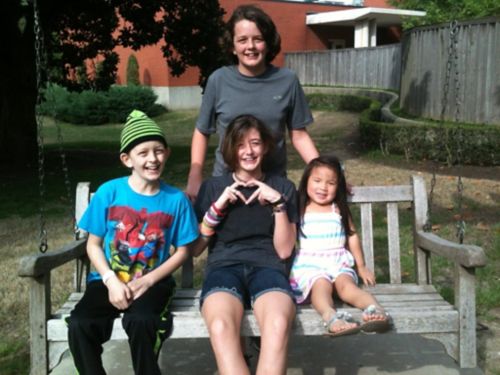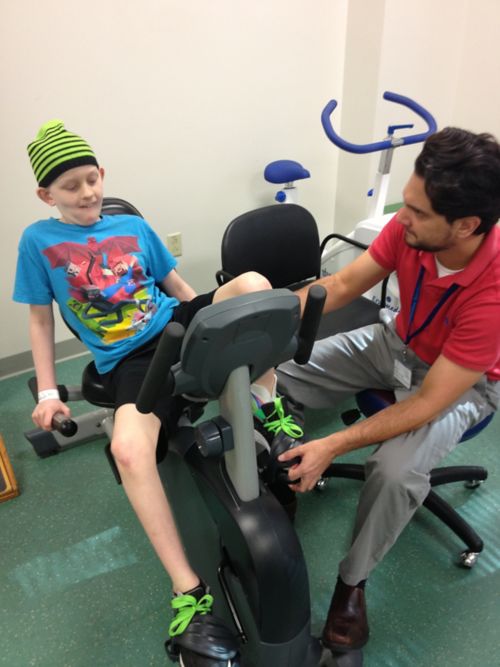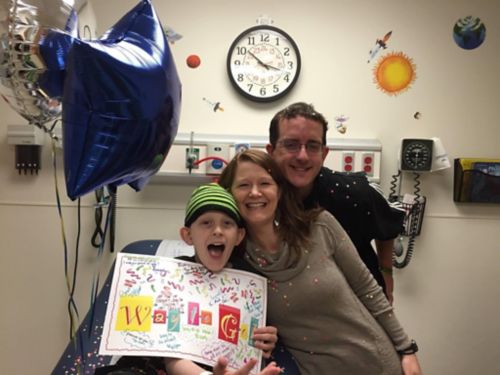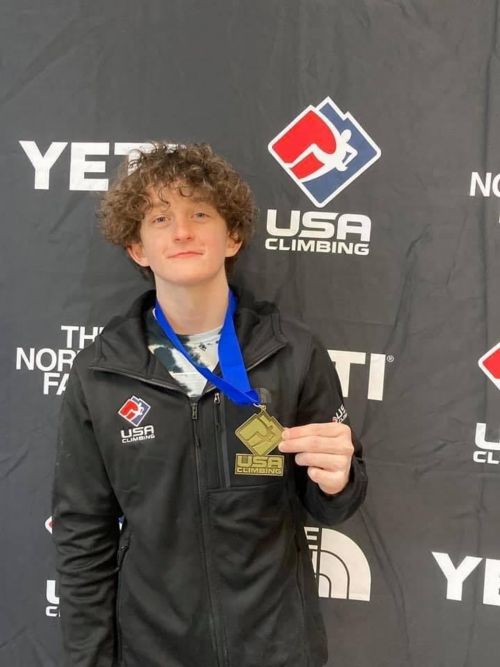In rock climbing, as in life, you never know what route you’re going to get.
In rock climbing, as in life, you never know what route you’re going to get.
Just ask Micah Winkle, 17, and his parents, Jason and Felicia. When Micah was 9, doctors found that he had Ewing sarcoma, a cancer of bone and soft tissue.
A few days after Thanksgiving 2014, Micah complained of pain in his left leg. His parents figured their energetic boy had hurt himself playing with his brother and sister or maybe while doing Brazilian jiu- jitsu, a form of martial arts he enjoyed. Perhaps it was “growing pains.”
After undergoing limb-sparing surgery at 9, Micah Winkle discovered a new passion that helped him regain physical strength and mental health.
But the pain got worse. Micah didn’t want to play outside anymore. The Winkles took him to his pediatrician, who ordered an x-ray. It showed a shadow on Micah’s left thigh near his hip.
The pediatrician told Micah’s parents their son should see an oncologist.
“I asked what an oncologist is because this just wasn’t part of our world,” Jason said.
Once he got into the gym, we saw healing—I mean physical healing but then also emotional healing for him. He began to blossom and thrive again. For us, as parents, it was exciting to see our son who had been through so much and for so long be happy again doing something that he loves.

Micah's brother and sisters were a source of support during his treatment for Ewing sarcoma.
Micah had a magnetic resonance imaging (MRI) test, which confirmed a tumor. The family had traveled to Atlanta, Georgia, from their home in China to finalize adoption of Micah’s younger sister. Jason and Felicia were missionaries in China and owned a business. The family was about to return to China when they learned Micah had cancer.
Instead, they packed everything they had with them into a minivan and headed to St. Jude Children’s Research Hospital in Memphis, Tennessee. At St. Jude, tests revealed that Micah had Ewing sarcoma. Because of the tumor’s location, there was a possibility he could lose his leg.
The family soon learned the term “limb-sparing surgery,” one of many new cancer-related words they would add to their vocabulary. If successful, the surgical procedure would remove the tumor but spare Micah’s leg.
“Our world turned upside down quickly,” Jason said. “Along with ‘Your child has cancer,’ you learn they’re probably going to lose their leg. It was important to us that, if possible, his leg be saved. That was a huge part of the choices that we made from that point on. How could we best preserve his leg and give him the best chances to continue his active lifestyle as a 9-year-old? We didn't even know what limb sparing was when we first started the search.”

Micah had lots of physical therapy to help him gain strength and mobility.
In June 2015, Micah had surgery. His surgeon, Michael Neel, MD, removed the tumor along with most of Micah’s left thigh bone and surrounding muscle. His thigh bone was replaced with a titanium rod. In addition, Micah had chemotherapy before and after his surgery.
His leg was saved. But he was left with nerve damage. At 10, Micah had to learn how to walk again.
“I don't remember that much about it,” Micah said. “But it was pretty painful most of the time and the recovery lasted a long time.”
Micah had physical therapy every Monday, Wednesday, and Friday. At first, he struggled just to move his leg.
A little over a year later, Micah could walk on his own. Jason hoped Micah could return to the sports he loved.
But Dr. Neel told the family that contact sports would not be possible. Micah’s left leg couldn’t withstand the impact.
Rock climbing became something he could pour himself into. When he is on the wall, it gives him something else to think about and just not to obsess with. He became passionate about climbing and loved it, so it really helped him thrive.

Micah with his parents, Jason and Felicia Winkle, the day he finished chemotherapy treatments.
Before his cancer diagnosis, Micah was active in Brazilian jiu-jitsu, a martial art that involves wrestling and fighting on the ground.
“Micah was a kid that was 100 miles per hour going everywhere, bouncing off walls,” Jason said. “We felt all these things were being taken away. His life was about running around, being active, and doing jiu-jitsu. From the beginning, the loss of different activities and sports was heavy on my heart. What is life going to be like for my child? ”
The Winkles began looking for other sports for Micah. His grandfather, a bow hunter, gave him a bow. Maybe archery would be good.
“Archery was pretty fun for a while, but it got super repetitive just because you're doing the same thing every single time,” Micah said. “It was moderately fun for a little bit, and then after a while, I don't know, I just got bored of it.”
He considered golf, swimming, or even playing a musical instrument. Then in 2018 he met Tom Shadyac at a hospital event. The film director was opening a rock-climbing gym in Memphis. He invited the Winkles to visit. They began going to the gym as a family outing.
“It was scary at first,” Felicia said. “I remember both my husband and I just constantly being like, ‘Be careful, Micah. Be careful. Don't fall. Be careful. Are you okay?’"
Micah kept at it. “Every single route is different,” he said. “It wasn't just repetitive, doing the same thing over and over. It was creative and exciting.”
Athletes start their climb not knowing how they will finish. They must figure out the best path or route along the way. Climbing is a physical activity. But it has helped Micah in other ways. During treatment, the outgoing kid shut down emotionally. He didn’t want to go anywhere or spend time with others. Later he shared that he experienced panic attacks at times.
“Once he got into the gym, we saw healing—I mean physical healing but then also emotional healing for him,” Jason said. “He began to blossom and thrive again. For us, as parents, it was exciting to see our son who had been through so much and for so long be happy again doing something that he loves.”

Micah is a 2-time winner of the USA Paraclimbing Nationals.
Micah grew stronger. His skills improved enough to join the competitive team at Memphis Rox in 2019. “I was crazy scrawny, this twig of a kid,” Micah said. “I started climbing and built more body mass. I was not good at all when I started out. As you continue climbing, you continue getting better. For a new climber, the best way to push yourself and get better is to climb everything. The more you climb, the more you learn.”
But there were challenges. Because he can’t put his full body weight on his left leg, he must figure out other ways to finish routes. That can take extra time. In competition he has a time limit.
At Memphis Rox, Micah met a climber who was an amputee. She competed in paraclimbing events designed for people with disabilities. So Micah did the same. Since then, he has won several awards.
He won the U.S. national paraclimbing championships in 2021 and 2022. He competed in the world championships in Moscow, Russia, placing 7th. He placed first in an international competition in October.
It took a few years, but Micah has found his passion.
“I think Micah will look back and realize rock climbing has been the biggest thing that has helped him overcome his cancer,” Felicia said. “He grew out of being the cancer kid to being the kid that could do something else. For a while, his identity was wrapped up in cancer kid, and then it became the rock climber. Rock climbing became something he could pour himself into. When he is on the wall, it gives him something else to think about and just not to obsess with. He became passionate about climbing and loved it, so it really helped him thrive.”
—
Posted: September 2022